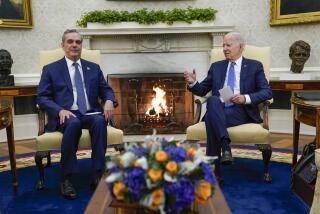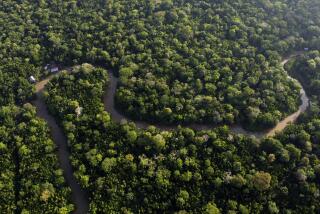Bush, Brazil’s Leader Agree to ‘Iron Out’ Trade Differences
- Share via
WASHINGTON — President Bush and Brazilian President Fernando Henrique Cardoso acknowledged Friday that tough negotiations lie ahead as the Western Hemisphere’s two largest economies jockey for advantage in creation of a 34-nation trading bloc joining North and South America.
Although Bush and Cardoso asserted that they share a belief in global free trade, they conceded that seemingly minor disagreements can have billion-dollar consequences.
“Difficulties are normal in the area of trade,” Cardoso told reporters in the White House driveway after his first official meeting with Bush.
Earlier, answering questions at a joint news conference, Cardoso said Bush’s philosophy puts the United States first, “and I would say the same . . . Brazil first.”
Nevertheless, both presidents insisted that far more issues unite than divide them.
“We’ve got a lot in common,” Bush said. “Brazil is a vast nation. It’s a democracy. It’s a country with huge economic potential. It’s a government run by a good man. . . . There’s no question in my mind that we’ll have good relations over the next years.”
Cardoso agreed: “Brazil and the United States have to be close . . . not just in terms of trade but in terms of the hemisphere in general, in terms of security, in terms of democracy.”
As the Western Hemisphere’s economic powerhouses, Brazil and the United States expect to dominate the trade discussions at the hemisphere summit planned for April 20-22 in Quebec. The heads of every government in the hemisphere except Cuba are expected to approve steps toward establishment of the free-trade zone, but years of detailed negotiations will remain.
“Sure there are going to be disagreements,” a White House official said in summing up the meeting. “But that’s what trade negotiations are all about--to get the disagreements out on the table.”
With an economy about twice the size of Russia’s and a population second only to the United States in the hemisphere, Brazil is determined to be taken seriously by Washington.
“Brazil is skeptical that the United States is prepared to deal with its restrictions that severely limit imports from Brazil, especially agricultural products,” said Sidney Weintraub, an economic expert at the Center for Strategic and International Studies, a Washington think tank. “The United States, in turn, harbors doubts that Brazil fully intends to support the conclusion of the [hemispheric free-trade] negotiations by 2005.”
Bush expressed optimism that the differences can be bridged.
“Absolutely, we can work together,” Bush said. “We had a very good discussion about trade. . . . We’ll work closely to iron out any differences that may exist.”
Bush directed U.S. Trade Representative Robert B. Zoellick to work closely with Brazilian trade negotiator Roberto Teixeira da Costa in the days leading up to the summit.
Bush must also persuade Congress to give him the so-called fast-track negotiating authority, which requires the lawmakers to vote a trade pact up or down without changes. Latin American nations have expressed concern about entering into an agreement with the U.S. if Congress has the power to alter it.
Some Democrats are reluctant to grant the authority because they fear that the administration will not address labor and environmental issues.
President Clinton’s fast-track authority expired in 1994.
More to Read
Sign up for Essential California
The most important California stories and recommendations in your inbox every morning.
You may occasionally receive promotional content from the Los Angeles Times.













